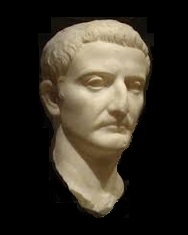
Tiberius, who succeeded Augustus Caesar as the second Roman emperor, came to power in 14 AD when Jesus was in his late teens. It was also under the watch of his appointee Pontius Pilate that Jesus was sentenced to death on the cross. Tiberius is mentioned only in Lk 3:1.

Tiberius' aristocratic parents divorced when he was four, and his mother Lavia Drusilla married Octavian, the future Augustus. Tiberius made a name for himself as a successful general, having fought alongside Augustus against the Parthians in 20 BC. He was also responsible for bringing Pannonia into the Roman Empire.
He had a less happy life in his marriage. Forced by political pressures from the Emperor, he divorced his own wife to marry Julia, Emperor Augustus' daughter and widow of Agrippa, Augustus' chief lieutenant. Julia, however, turned out to be a scandal, a young woman so notorious in her sexual promiscuity her father eventually had to exile her from Rome.
Though Augustus had plans to make heirs to his throne either of his two grandsons by Julia and Agrippa, they died before their time came. In 13 AD Tiberius, as Augustus' adopted son, was granted authority equal to Augustus everywhere throughout the empire but Rome. He succeeded Augustus upon the latter's death the following year. As an emperor Tiberius was competent and efficient but unimaginative, trusting greatly on the leadership of his lieutenant Sejanus, an effective if hated and feared figure in Rome. In 31 AD, however, Sejanus was discovered to be plotting to kill Tiberius and his surviving heirs-potential. Tiberius had him strangled and his body thrown to the mob who took delight in dismembering it.
Sick and tired of the dirty business of politics, which he never liked anyway, Tiberius reclused himself on the island of Capri where he died in 37 AD. He was succeeded by his adopted grandson, Gaius, aka Caligula.

©ALBERITH